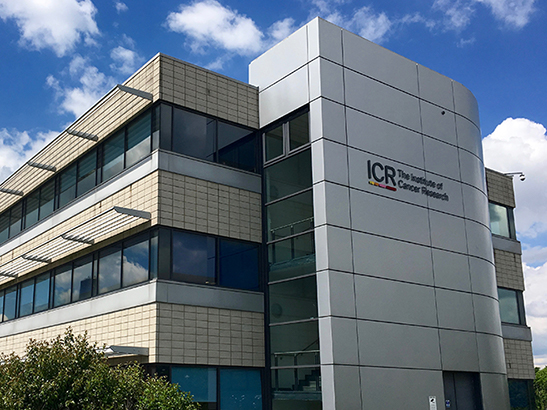
Image: Sir Richard Doll building, Sutton
Staff and students from across The Institute of Cancer Research, London, are using their scientific and clinical expertise as part of the national response to the coronavirus pandemic.
Helping the NHS
Expert clinical staff and students have suspended their research and are instead working at our partner hospital, The Royal Marsden, and elsewhere in the NHS to help the health service cope with the surge in coronavirus cases.
Professor Clare Turnbull, for example, whose team at The Institute of Cancer Research (ICR) is usually focused on genetics, has been using her expertise in public health to help develop dynamic local policies around zoning based on predicted volumes, Personal Protective Equipment (PPE), staff testing, patient testing and return to work.
Professor Turnbull is also working on a rapidly moving project to model how delays to cancer surgery due to COVID-19 could affect patient outcomes, in collaboration with colleagues at the ICR, The Royal Marsden, Imperial College, UCLH and the University of Cambridge. These models have been supplied to the London Cancer Alliances and NHS Improvements to help guide cancer treatment.
Other staff members have dropped their usual duties and are volunteering in non-clinical roles at The Royal Marsden.
We are also throwing the ICR’s scientific expertise behind efforts to tackle the coronavirus. Professor Richard Houlston, Head of our Division of Genetics and Epidemiology, is leading the ICR’s work to explore how our scientific expertise could be brought to bear on national research efforts to combat the COVID-19 pandemic.
Dr Mike Hubank, Head of Clinical Genomics at The Royal Marsden and Reader in Translational Genomics at the ICR, is leading the co-ordination of cancer diagnostic sequencing services across London from our Centre of Molecular Pathology, a joint facility of the ICR and The Royal Marsden in Sutton. Dr Hubank has also played an instrumental role in setting up NHS staff testing for coronavirus at the Francis Crick Institute.
The ICR has sent specialist scientific equipment to national testing laboratories set up by NHS England and begun production of protective masks in our workshop, particularly for use by NHS workers at the Royal Brompton NHS Foundation Trust in Chelsea.
We have a proven track-record of awe-inspiring research, which is transforming the lives of cancer patients around the world. This work is made possible by an extraordinary community of generous donors, which includes individuals, trusts and foundations and charity partners.
Contributing to COVID-19 research
We are also contributing to research into the COVID-19 virus, SARS-CoV2. A few of our laboratories remain open for research into the virus, and our computational scientists are also contributing to the national effort.
Professor Terry Rabbitts, Professor of Chromosomal Translocations and Intracellular Antibody Therapeutics at the ICR, is leading plans to develop high-affinity antibodies for the coronavirus using Escherichia coli-based protein production at the ICR. Our researchers are also looking at whether it is possible to repurpose certain cancer drugs against the virus.
Professor Bissan Al-Lazikani is meanwhile leading a team of researchers who are seeking to create a comprehensive bank of information about Covid-19 research, for use by scientists across the world.
Professor Paul Workman, Chief Executive at the ICR, said:
“The ICR’s scientists, clinicians and research facilities are among the best in the world, and we’re pleased to be making an important contribution to our national effort to respond to COVID-19.
“We’re proud of our clinical colleagues who are working at the NHS front line, and our scientists are also playing key roles in expanding access to testing for coronavirus and finding ways to combat the virus.”
